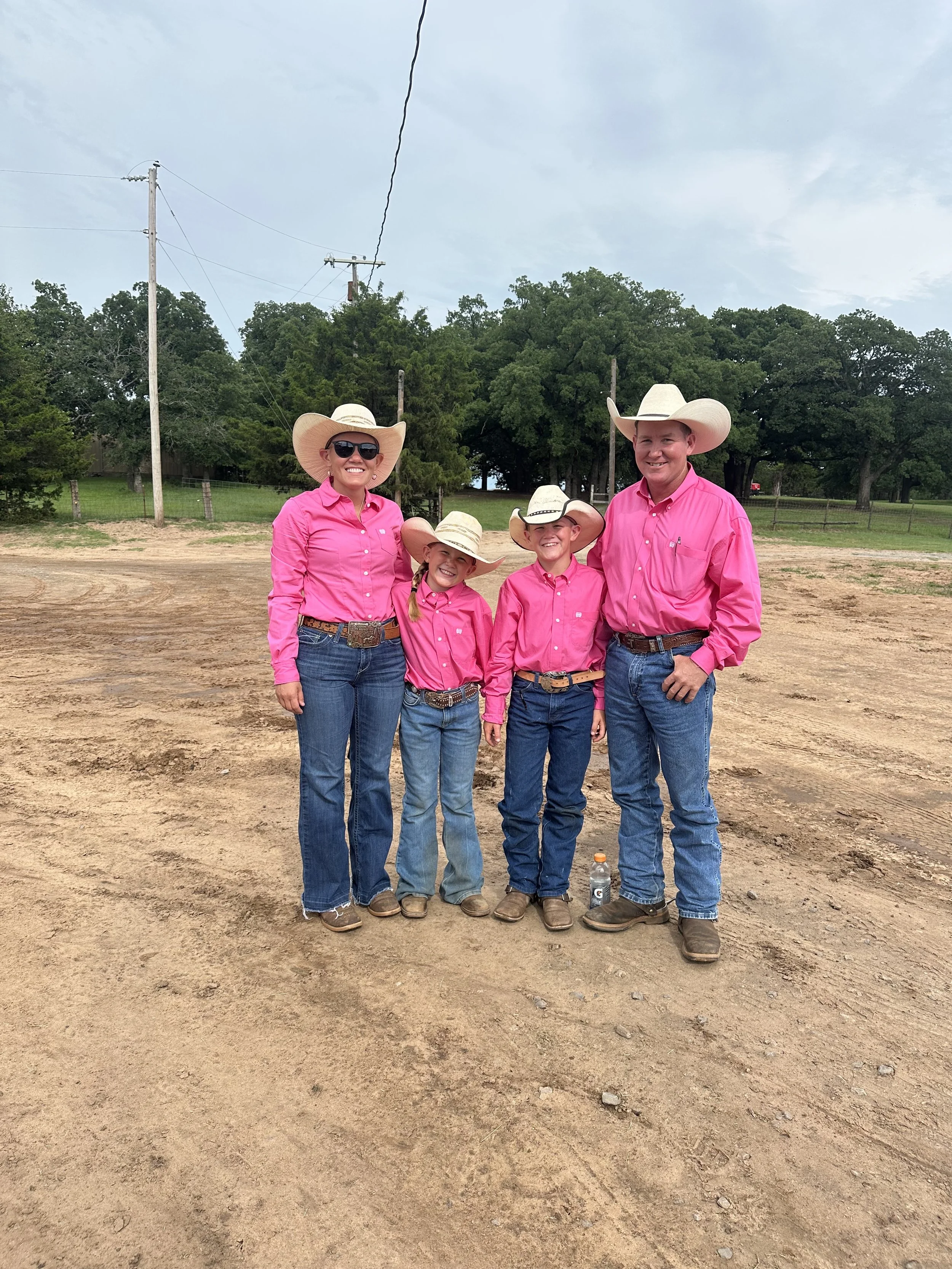Michelle Taylor never planned for cancer. But then again, who does?
Michelle Taylor didn’t expect her world to tilt sideways that day at the hospital.
Michelle, Ruth, Harrison, and Charlie Taylor.
She remembers the moment clearly: sitting in the sterile room, staring at a monitor, waiting on a doctor. When the biopsy was mentioned, there was no soft entry. Just the word “malignant” hanging in the air like smoke.
“I called my husband from the hospital room,” she said. “I told him they thought it looked like cancer. That moment—and the one where I had to come home and tell my kids—those are the hardest things I’ve ever had to do.”
Taylor, a wife, mother of two, and lifelong cattle producer, has spent the past year in the trenches of breast cancer treatment. Her diagnosis came fast. Her surgery came faster. “I had one day to prepare for my mastectomy,” she said. “Just one.”
She speaks plainly about the toll it has taken—not only on her body but on the rhythm of her family’s life. Tasks that once came easily now knock her flat. The chemo wiped her out. Work on their cow-calf operation slowed. The weekend trip her kids kept asking about never happened.
“There are days I feel like the old me,” she said. “Then, bam—just kidding. You can’t do that today.”
When your family lives and works off the land, rest isn’t built into the schedule. Her husband and in-laws picked up the slack, but the absence left a dent. “Not being able to do farm work put more on them,” she said. “It put us behind in every part of our lives.”
But even in the hard parts, Taylor makes room for joy. She still bakes pies for the county fair. She still watches her kids—Harrison and Ruth—grow up in the same lifestyle that shaped her. She still puts up hay. And she still jokes, even about the dark parts.
Her “Cancer is a hoe” T-shirt makes regular appearances at the cancer center. “It brings joy in dark times,” she said, laughing. “You should see the oncologist’s face when I wear it.”
Taylor is one of this year’s Rural Gone Urban Foundation Love Bomb recipients, a grant program offering judgment-free financial support to women navigating cancer. With her Love Bomb, the Taylors plan to finally take the trip they’ve been putting off for years—a family road trip to the Tetons.
“I’ve always wanted to go to Yellowstone or the Tetons. Or both,” she said. “We kept saying we’d wait until the kids were older. They’re 11 and 8 now. And I’ve realized—there’s never a perfect time. You just go.”
The plan is to drive, not fly. Take the long way. See the land. Make a few unplanned stops. “Honestly, the drive might be half the fun,” she said. “We want to see everything.”
She hopes it will be like their last getaway to Broken Bow—a quiet cabin, simple fun, and memories that stick. “They still talk about that trip,” she said. “I want them to have more of those. I want them to remember this life, not just the cancer parts.”
Taylor lives in Perkins, Oklahoma, with her husband Charlie and their two children. Together, they raise cow-calf pairs and stocker cattle—a way of life that she says was shaped by her grandfather, Gene Gragg. When other men took their sons to the sale barn, Gene brought Michelle. When others expected boys to take over, he expected her.
“He told me I could do anything,” she said. “However I wanted, and just as good as anyone else.”
Gragg passed away a year before Michelle’s diagnosis. She and her brother cared for him in the final years of his life, and she carries his belief in her like a compass.
“I wanted to be him,” she said. “He was my best friend.”
She doesn’t seek the spotlight. In fact, she’d rather be behind the scenes, but her story is one worth telling—not because it’s dramatic, but because it’s real. Because she’s still here. Because she’s still showing up.
“You don’t expect to be in the waiting room, getting chemo, wondering if you’ll get to see your kids grow up,” she said. “But you also don’t expect the people who show up for you.”
When the local roundup club passed the boot to raise funds, it was her community coming full circle. “We’d do it all over again to help as many women as we can,” she said. “That’s what makes this place home.”

